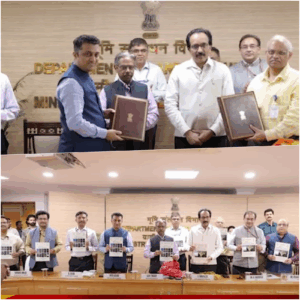Revolutionizing Property Transactions: India’s Move to Digitalize Land and Property Registrations
In a significant move towards transparency and digitalization, the Indian government is set to overhaul the 117-year-old property registration system. The Ministry of Rural Development, through its Land Resources Department, has drafted a new bill aimed at replacing the Registration Act of 1908. This proposed legislation will mandate online registration of properties across the country and grant legal recognition to digital records.
..
.
.

Currently, the Registration Act of 1908 is applicable in all states, but states have the authority to make amendments with consultation from the central government. Many states have already initiated steps towards adopting online registration, prompting the central government to propose a uniform law applicable nationwide.
The Land Resources Department has prepared the draft Registration Bill 2025, which, once enacted, will replace the pre-constitutional Registration Act of 1908. Under this bill, the registration of documents such as Agreements to Sell, Power of Attorney, and Sale Certificates will become mandatory. The use of Aadhaar numbers will be based on citizens’ consent, with alternative identification processes available for those unwilling to share their Aadhaar details.
The new framework will allow property documents to be registered through e-submissions, with registration certificates being electronically valid. This initiative aims to curb fraud and tampering with documents, enhancing the integrity and reliability of the registration process.
The ministry emphasizes that the role of registered documents has increased significantly in both public and private transactions, often serving as the basis for financial, administrative, and legal decisions. Therefore, it is essential for the registration process to be robust, trustworthy, and adaptable to emerging social and technological developments.
Several states and union territories have already implemented innovations like online document submissions and digital identity verification under the existing 1908 Act. Clearly defining the roles and responsibilities of registration officials is equally important to maintain the integrity and reliability of the registration process.
play video:
The Registration Bill 2025 aims to realize this vision, but its impact on the public and the changes it will bring about remain to be seen. As the country moves towards a digital future, this bill represents a crucial step in modernizing property transactions and ensuring a transparent, efficient, and secure system for all.
News
Missing PG Student Monica from Darbhanga CM College Found in Shocking Condition—Police Stunned
Missing Darbhanga CM College Student Monica Found Safe—Reveals She Left Home Willingly to Marry A week-long mystery surrounding the disappearance…
Chaos on the Kanwar Yatra: Devotees Go on Rampage, Vandalize Dhaba from Muzaffarnagar to Roorkee!
Kanwar Yatra Turns Violent: Kanwariyas Vandalize Dhabas from Muzaffarnagar to Roorkee Over Onion in Food A shocking wave of violence…
Uproar After Samajwadi Party Leader Sunil Yadav’s Death: Ex-MLA and Brother-in-Law Named in FIR!
Uproar in Sultanpur After Samajwadi Party Leader Sunil Yadav’s Mysterious Death: Former MLA and Brother-in-Law Named in FIR A wave…
Shocking Viral Video: Teacher Beats Student with Stick in Bihar School—Discipline or Violence?
Bihar School Turns Battleground: Viral Video Shows Teacher Beaten Brutally by Angry Parents—Discipline or Violence? A shocking video has taken…
Forced to Strip at Knifepoint: Obscenity in the Name of Jobs—What’s Happening in Uttar Pradesh?
Job Promise Turns Nightmare: Woman Forced to Undress at Knifepoint in Uttar Pradesh Official’s Quarters Uttar Pradesh: A shocking video…
UP Education Minister Injured in Road Accident as Convoy Cars Collide
UP Education Minister Gulab Devi Injured in Road Accident as Convoy Cars Collide Hapur, Uttar Pradesh: Uttar Pradesh’s Education Minister,…
End of content
No more pages to load












